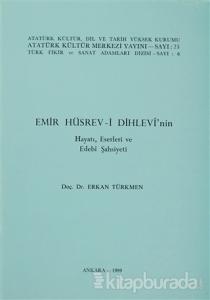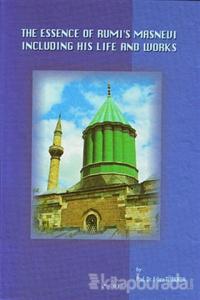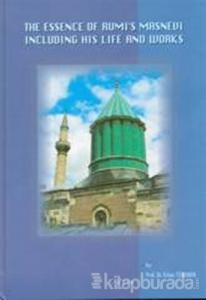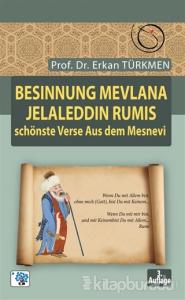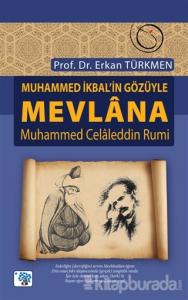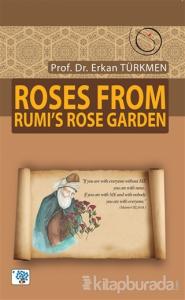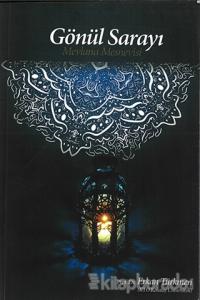Teknik Bilgiler
Stok Kodu
3001676100639
Boyut
140-200
Sayfa Sayısı
380
Kapak Türü
Ciltli
Kağıt Türü
1.Hamur
Dili
İngilizce
The Essence Of Rumı's Masnevı (Küçük Boy)
Yazar:
Erkan Türkmen
Yayınevi : Nüve Kültür Merkezi
30,00TL
Satışta değil
3001676100639
403050

https://www.kitapburada.com/kitap/the-essence-of-rumis-masnevi-kucuk-boy
The Essence Of Rumı's Masnevı (Küçük Boy)
30.00
It is a remarkable research in English on Rumi that covers the period in which Rumi lived and the teachings of Rumi's father,his disciple Brurhaneddin Tirmizi and Rumi' Master Shams. Then the best verses of Rumi's Masnavi follow in original form (Persian), corrected under the light of authentic MSS.Then the English translation of the verses is given in two parts: a)Literal translation of the verses b)The commentary of the same based on the best commentaries written in Urdu,Persian, Turkish(Ottoman) and English
Book Details
It is a remarkable research in English on Rumi (Mevlana Jelal al-Din Rumi) that covers the period in which Rumi lived and the teachings of Rumi's father, his disciple Burhaneddin Tirmizi and Rumi's Master Shams. Then the best verses of Rumi's Masnevi follow in original form (Persian), corrected under the light of authentic MSS. Then the English translation of the verses is given in two parts:
a.Literal translation of the verses in Modern English.
b.The commentary of the same is based on the best commentaries written in Urdu, Persian, Turkish (Ottoman) and English. Consequently, this new step gives an essential skeleton of the Masnevi in a much more organised way to a reader and a ladder to the spiritual traveller who wants to reach a high stage of humanity.
Mevlana Jelal al-Din Rumi
Mevlana Jelal al-Din Rumi, who is known as "Mevlana" in Turkey and as "Rumi" in the western world, can be called a mystic poet, a thinker, a theosophist or a Sufi; but if you could ask him, "What are you?" He would say, "I am nothing but a simple lover of God". A true lover of God has no definite nationality, language or race for he loves everything without discrimination. He wrote the Masnevi in six volumes, which gives the message of love, unity, perfection, brotherhood and peace. It teaches man the path of Divine Love that exalts him from lower stage to the highest one.
For more than seven centuries his Masnevi has influenced the social and religious life in Turkey, Iran, Afghanistan, Pakistan, India and the Central Asia. Recently, he has also drawn attention of the Western scholars and poets.
He was born at Balkh, now in Afghanistan, in the year 1207; and was brought up under his father's good care who himself was a well-respected scholar and a lover of God. Three years before the furious army of the Mongols invaded Afghanistan, Rumi's father migrated from his motherland to the Central Anatolia and passing through Iran, Iraq, Mecca and Damascus he came to the city of Karaman 100 km in the south of Konya, the capital of the Great Seljuk Empire those days. He stayed in Karaman for some years where Rumi got married. Being invited by the ruling Sultan Qayqubad they came to Konya.
Rumi studied Arabic, Persian theology, jurisprudence, logic, philosophy, mathematics, Islamic history and commentaries on the Koran, partially at Balkh, Damascus and partially at Konya.
When he met Shams-i Tebrizi, a great lover of God and a dervish, his whole life changed. He gave up teaching and became a Godloving person. He learnt Divine secrets not from the books but from the chest of Shams. When Shams left, Rumi was alone. He began to moan like the reed-flute. His soul became restless due to the love of God. During ten years he wrote his Masnevi of 30.000 verses all in the same metre in Persian.
Book Details
It is a remarkable research in English on Rumi (Mevlana Jelal al-Din Rumi) that covers the period in which Rumi lived and the teachings of Rumi's father, his disciple Burhaneddin Tirmizi and Rumi's Master Shams. Then the best verses of Rumi's Masnevi follow in original form (Persian), corrected under the light of authentic MSS. Then the English translation of the verses is given in two parts:
a.Literal translation of the verses in Modern English.
b.The commentary of the same is based on the best commentaries written in Urdu, Persian, Turkish (Ottoman) and English. Consequently, this new step gives an essential skeleton of the Masnevi in a much more organised way to a reader and a ladder to the spiritual traveller who wants to reach a high stage of humanity.
Mevlana Jelal al-Din Rumi
Mevlana Jelal al-Din Rumi, who is known as "Mevlana" in Turkey and as "Rumi" in the western world, can be called a mystic poet, a thinker, a theosophist or a Sufi; but if you could ask him, "What are you?" He would say, "I am nothing but a simple lover of God". A true lover of God has no definite nationality, language or race for he loves everything without discrimination. He wrote the Masnevi in six volumes, which gives the message of love, unity, perfection, brotherhood and peace. It teaches man the path of Divine Love that exalts him from lower stage to the highest one.
For more than seven centuries his Masnevi has influenced the social and religious life in Turkey, Iran, Afghanistan, Pakistan, India and the Central Asia. Recently, he has also drawn attention of the Western scholars and poets.
He was born at Balkh, now in Afghanistan, in the year 1207; and was brought up under his father's good care who himself was a well-respected scholar and a lover of God. Three years before the furious army of the Mongols invaded Afghanistan, Rumi's father migrated from his motherland to the Central Anatolia and passing through Iran, Iraq, Mecca and Damascus he came to the city of Karaman 100 km in the south of Konya, the capital of the Great Seljuk Empire those days. He stayed in Karaman for some years where Rumi got married. Being invited by the ruling Sultan Qayqubad they came to Konya.
Rumi studied Arabic, Persian theology, jurisprudence, logic, philosophy, mathematics, Islamic history and commentaries on the Koran, partially at Balkh, Damascus and partially at Konya.
When he met Shams-i Tebrizi, a great lover of God and a dervish, his whole life changed. He gave up teaching and became a Godloving person. He learnt Divine secrets not from the books but from the chest of Shams. When Shams left, Rumi was alone. He began to moan like the reed-flute. His soul became restless due to the love of God. During ten years he wrote his Masnevi of 30.000 verses all in the same metre in Persian.
- Açıklama
- It is a remarkable research in English on Rumi that covers the period in which Rumi lived and the teachings of Rumi's father,his disciple Brurhaneddin Tirmizi and Rumi' Master Shams. Then the best verses of Rumi's Masnavi follow in original form (Persian), corrected under the light of authentic MSS.Then the English translation of the verses is given in two parts: a)Literal translation of the verses b)The commentary of the same based on the best commentaries written in Urdu,Persian, Turkish(Ottoman) and English
Book Details
It is a remarkable research in English on Rumi (Mevlana Jelal al-Din Rumi) that covers the period in which Rumi lived and the teachings of Rumi's father, his disciple Burhaneddin Tirmizi and Rumi's Master Shams. Then the best verses of Rumi's Masnevi follow in original form (Persian), corrected under the light of authentic MSS. Then the English translation of the verses is given in two parts:
a.Literal translation of the verses in Modern English.
b.The commentary of the same is based on the best commentaries written in Urdu, Persian, Turkish (Ottoman) and English. Consequently, this new step gives an essential skeleton of the Masnevi in a much more organised way to a reader and a ladder to the spiritual traveller who wants to reach a high stage of humanity.
Mevlana Jelal al-Din Rumi
Mevlana Jelal al-Din Rumi, who is known as "Mevlana" in Turkey and as "Rumi" in the western world, can be called a mystic poet, a thinker, a theosophist or a Sufi; but if you could ask him, "What are you?" He would say, "I am nothing but a simple lover of God". A true lover of God has no definite nationality, language or race for he loves everything without discrimination. He wrote the Masnevi in six volumes, which gives the message of love, unity, perfection, brotherhood and peace. It teaches man the path of Divine Love that exalts him from lower stage to the highest one.
For more than seven centuries his Masnevi has influenced the social and religious life in Turkey, Iran, Afghanistan, Pakistan, India and the Central Asia. Recently, he has also drawn attention of the Western scholars and poets.
He was born at Balkh, now in Afghanistan, in the year 1207; and was brought up under his father's good care who himself was a well-respected scholar and a lover of God. Three years before the furious army of the Mongols invaded Afghanistan, Rumi's father migrated from his motherland to the Central Anatolia and passing through Iran, Iraq, Mecca and Damascus he came to the city of Karaman 100 km in the south of Konya, the capital of the Great Seljuk Empire those days. He stayed in Karaman for some years where Rumi got married. Being invited by the ruling Sultan Qayqubad they came to Konya.
Rumi studied Arabic, Persian theology, jurisprudence, logic, philosophy, mathematics, Islamic history and commentaries on the Koran, partially at Balkh, Damascus and partially at Konya.
When he met Shams-i Tebrizi, a great lover of God and a dervish, his whole life changed. He gave up teaching and became a Godloving person. He learnt Divine secrets not from the books but from the chest of Shams. When Shams left, Rumi was alone. He began to moan like the reed-flute. His soul became restless due to the love of God. During ten years he wrote his Masnevi of 30.000 verses all in the same metre in Persian.
- Yorumlar
- Yorum yazBu kitaba henüz kimse yorum yapmamıştır.

